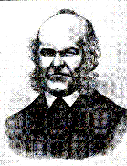George Odger

George Odger (1813-1877) was a pioneer British trade unionist and radical politician. He is best remembered as the head of the London Trades Council during the period of formation of the Trades Union Congress and as the first President of the First International.
Biography
Early years
George Odger was born in Roborough, Devon, and trained as a shoemaker. In his younger years, he was a Chartist.
After travelling in search of work, he settled in London and joined the Ladies Shoemakers' Society.[1] In 1859, he was a prominent supporter of the London builders' strike, and became a leading member of the London Trades Council when it was founded the following year.
Political career
In 1862, Odger became the Secretary of the London Trades Council, a post he held for ten years. Unlike most of its other office holders, he continued to work in his trade.
Also in 1862, Odger became the Chairman of the Manhood Suffrage and Vote by Ballot Association. In 1863, he convinced The Bee-Hive newspaper to switch from supporting the Confederates in the American Civil War. He also attended an Anglo-French labour meeting, which resulted in the establishment of the International Workingmen's Association in 1864. Odger became its first president.
Odger was associated with the Workman's Advocate, which became the press organ of the International and the Reform League, and from 1866–67 he was editor of the renamed Commonwealth. Also in 1866, he represented the London Trades Council at the first conferences the United Kingdom Alliance of Organised Trades, while in 1867, he joined the Conference of Amalgamated Trades.
Shortly after the Reform League's Hyde Park demonstration in 1867, Odger attended a private meeting of a dozen senior members of the League in which the French Revolutionary Gustave Paul Cluseret proposed they start a Civil War in England. According to John Bedford Leno, George Odger spoke out in support of Cluseret's proposal but this was misreported in the next days issue of The Times. George Odger was in the minority of the League, which rejected the proposal overwhelmingly.
Odger resigned from the International in 1871 after disagreements with Karl Marx over the latter's interpretation of the Paris Commune in his pamphlet The Civil War in France. Odger remained active in the Trades Union Congress (TUC), he was the Secretary of its Parliamentary Committee, the post later to become the General Secretary, from 1872 to 1873.
Odger also stood as a Lib–Lab candidate in Southwark in the 1870 by-election and the 1874 UK general election. He was invited to stand in the 1870 Southwark by-election, the first ever candidate to stand for Labour, by Francis William Soutter and Will Stafford. He also became a supporter of the Land and Labour League and was one of the more well-known figures in the short-lived republican movement of the late 1860s and early 1870s.
Death and legacy
Odger died on 4 March 1877. He was remembered at the time of his death as a "good, clear writer and a fluent speaker. He was not what is called 'eloquent,' but he was better; he spoke with force, with effect, with a knowledge of his subject."[2]
Henry James wrote of the funeral: "The element of the grotesque was very noticeable to me in the most marked collection of the shabbier English types that I had seen since I came to London. The occasion of my seeing them was the funeral of Mr. George Odger, which befell some four or five weeks before the Easter period. Mr. George Odger, it will perhaps be remembered, was an English Radical agitator of humble origin, who had distinguished himself by a perverse desire to get into Parliament. He exercised, I believe, the useful profession of a shoemaker, and he knocked in vain at the door that opens but to the refined. But he was a useful and honourable man, and his own people gave him an honourable burial."
George Odger is buried in Brompton Cemetery.
Memorials
Odger is listed on the Reformers Memorial in Kensal Green Cemetery in London.
Odger Street on the John Burns' Latchmere Estate in Battersea is named after him.
Footnotes
Further reading
- Dictionary of Labour Biography, vol. XIII, edited by Keith Gildart and David Howell, Basingstoke 2010, pp. 292–300.
- Oxford Dictionary of National Biography
- The Aftermath with Autobiography of the Author (John Bedford Leno published By Reeves & Turner, London 1892)
- Henry James, "An English Easter" in "English Hours" first published 1905
- D. Mares: Die englischen Publikationsorgane der IAA. Zum Kontext der politischen Tätigkeit von Karl Marx, in: MEGA-Studien (1998), issue 2, 24-48.
| Trade union offices | ||
|---|---|---|
| Preceded by George Howell |
Secretary of the London Trades Council 1862–1872 |
Succeeded by George Shipton |
| Preceded by George Potter |
Secretary of the Parliamentary Committee of the TUC 1872–1873 |
Succeeded by George Howell |